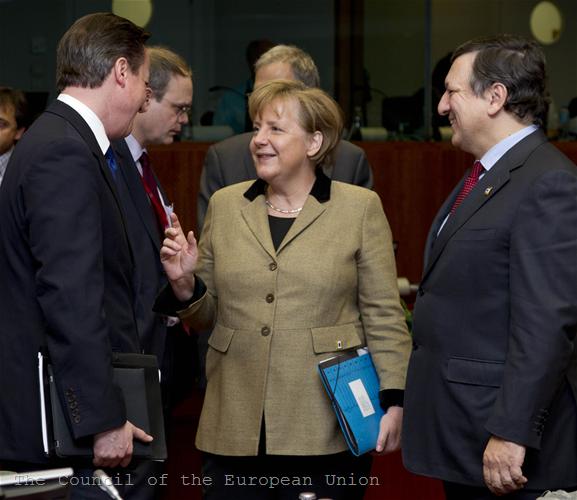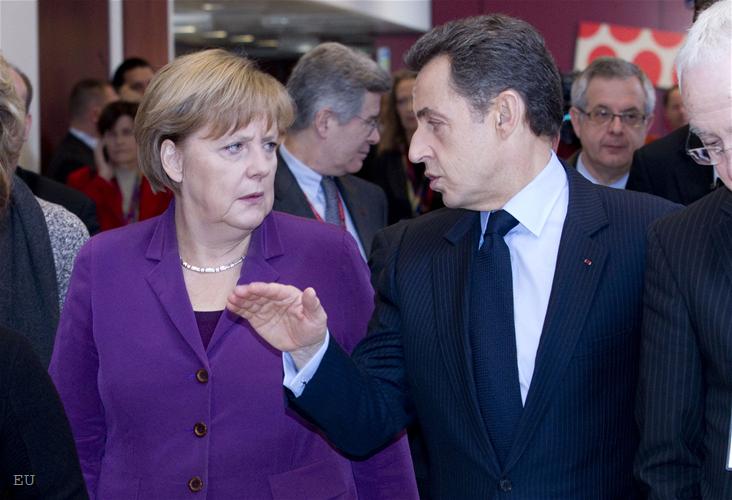Tensions Ahead of the EU Summit in Brussels
Ralitsa Kovacheva, January 30, 2012
 The first European Council for this year, devoted to growth and employment, is taking place against the background of the general strike in the Belgian capital. In addition to creating direct difficulties for the leaders' arrival, the strike is literally illustrating the dilemma faced by most European countries - how to achieve economic growth and employment in an environment of severe budget constraints and market pressures.
The first European Council for this year, devoted to growth and employment, is taking place against the background of the general strike in the Belgian capital. In addition to creating direct difficulties for the leaders' arrival, the strike is literally illustrating the dilemma faced by most European countries - how to achieve economic growth and employment in an environment of severe budget constraints and market pressures.
The protest, the first in this scale for the last 20 years, is directed against the Belgian government's austerity plans, amounting to 11.3 billion euros. Belgium has been placed in excessive deficit procedure and the European Commission warned that the country might not meet its target to reduce the deficit below 3% of GDP within 2012. Belgium's public debt is among the highest in the euro area as it is expected to reach 97% of GDP this year. Moreover, the trade unions fear that the country could be under pressure to remove the indexing of wages. This is one of the measures under the Euro Plus Pact aimed to adjust wages to the level of productivity and boost competitiveness.
On the eve of the European Council, French President Nicolas Sarkozy announced  a package of measures to promote employment and growth. Only a few days earlier in a common message to the EU leaders, Mr Sarkozy and German Chancellor Angela Merkel presented a detailed vision about what should be done at European level to promote growth and employment. In the same spirit are the "German style" measures, announced by Nicolas Sarkozy, which include support for small and medium businesses and liberalisation of the labour market.
a package of measures to promote employment and growth. Only a few days earlier in a common message to the EU leaders, Mr Sarkozy and German Chancellor Angela Merkel presented a detailed vision about what should be done at European level to promote growth and employment. In the same spirit are the "German style" measures, announced by Nicolas Sarkozy, which include support for small and medium businesses and liberalisation of the labour market.
The plan provides for a reduction of social charges of employers amounting to 13 billion euros. In order to fill the budget gap in, as of October VAT will be increased from 19.6 to 21.2%, the tax on income from interest and dividends will also be increased, as well as the sales tax. As of August a tax on financial transactions will be introduced. It will amount to 0.1% and will not apply to bonds, like the FTT proposed by the European Commission. The proposal, which France and Germany have been lobbying for quite some time for, meets strong resistance both at EU and global level.
"What we want to do is create a shock-wave and set an example that there is absolutely no reason why those who helped bring about the crisis shouldn't pay to restore the finances," Sarkozy said quoted by the BBC. The tax is expected to bring revenue of around 1 billion euros and help to reduce the budget deficit, the president explained. He promised also changes in labour laws to allow companies and trade unions to negotiate on working pay and conditions at a local level. This means that the famous 35-hour workweek in France will no longer be the "sacred cow" of labour law. Measures to promote employment include an obligation for companies with over 250 employees to hire young people up to 5% of its staff. Sarkozy also announced the creation of a state investment bank with a capital of 1 billion euros to lend to small and medium enterprises.
 Nicolas Sarkozy, who turned 57 on Saturday, announced the new measures just hours after officially obtaining support from German Chancellor Angela Merkel for his bid for a second presidential term. According to the polls, Mr Sarkozy is seriously lagging behind his rival - Socialist Francois Hollande. The views of Mr Hollande on resolving the crisis, however, (an ECB intervention and the creation of eurobonds) are not to the taste of Ms Merkel, so it is understandable why she wants Sarkozy to remain in office for another term. The first round of the presidential elections in France is scheduled for 22 April and the second for 6 May.
Nicolas Sarkozy, who turned 57 on Saturday, announced the new measures just hours after officially obtaining support from German Chancellor Angela Merkel for his bid for a second presidential term. According to the polls, Mr Sarkozy is seriously lagging behind his rival - Socialist Francois Hollande. The views of Mr Hollande on resolving the crisis, however, (an ECB intervention and the creation of eurobonds) are not to the taste of Ms Merkel, so it is understandable why she wants Sarkozy to remain in office for another term. The first round of the presidential elections in France is scheduled for 22 April and the second for 6 May.
The summit in Brussels is once again going to deal with Greece. Against the  background of blocked negotiations with private creditors to restructure the Greek debt, The Financial Times reported of a German plan according to which Athens would actually be deprived of budget sovereignty. According to the newspaper, the plan provides for a European “budget commissioner” with the power to veto Greek tax and spending decisions, in return for a second Greek bailout from the EU and the IMF. Finance Minister Evangelos Venizelos said, quoted by the newspaper, that such a proposal would force Greece to choose between “financial assistance” and “national dignity”. Beside closing the deal on the debt, the EU and the IMF have tabled to Athens some other conditions to obtain a second loan, The Financial Times wrote. The 10-page list of demands includes cutting 150,000 public sector jobs within three years and cutting 2012 budget deficit by a further 1 per cent of GDP.
background of blocked negotiations with private creditors to restructure the Greek debt, The Financial Times reported of a German plan according to which Athens would actually be deprived of budget sovereignty. According to the newspaper, the plan provides for a European “budget commissioner” with the power to veto Greek tax and spending decisions, in return for a second Greek bailout from the EU and the IMF. Finance Minister Evangelos Venizelos said, quoted by the newspaper, that such a proposal would force Greece to choose between “financial assistance” and “national dignity”. Beside closing the deal on the debt, the EU and the IMF have tabled to Athens some other conditions to obtain a second loan, The Financial Times wrote. The 10-page list of demands includes cutting 150,000 public sector jobs within three years and cutting 2012 budget deficit by a further 1 per cent of GDP.
The EU leaders are also expected to endorse the Treaty on the European Stability Mechanism, which has been modified in order to activate the rescue fund a year ahead of schedule - from July 2012. The changes also allow in certain cases decisions to grant rescue loans to be taken by a qualified majority of 85% instead of unanimity, and provide a link between the bailout fund and the new Treaty on stability, coordination and governance of the euro area (the so called ‘fiscal compact’). Today's meeting will probably finalise the treaty text, as well as the number of countries ready to sign it.
 | © The Council of the European Union
| © The Council of the European Union | © EU
| © EU